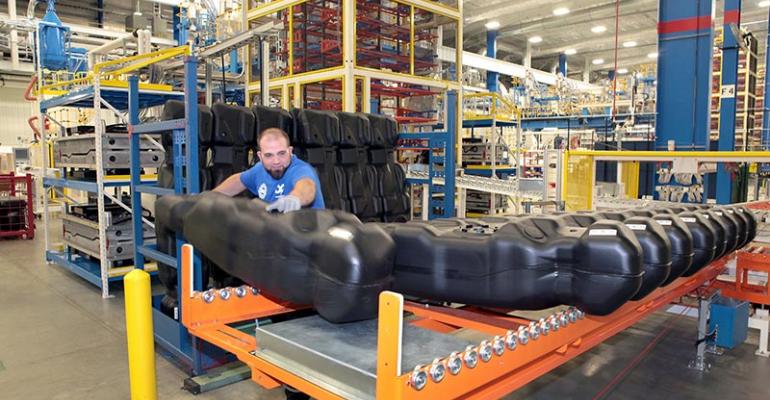HURON TOWNSHIP, MI – For a number of years, Ford was a relatively minor customer in the U.S. for Plastic Omnium and its Inergy fuel-tank business. From its plant in Adrian one hour away, Inergy supplied Ford with blow-molded tanks for Focus compacts and Edge CUVs.
But within a year, the world’s largest plastic fuel-tank producer will count Ford its No.1 North American customer as volume ramps up at its new plant here. By the end of this year, the plant is expected to manufacture 800,000 tanks, and another 1.5 million next year, all for Ford.
The new plant springs from an agreement signed in June 2011 by Plastic Omnium to purchase a Milan, MI, fuel-tank operation owned by Ford and its Automotive Components Holdings group.
Plastic Omnium, a French conglomerate that also makes fascia for vehicles, was not interested in the entire 50-year-old Milan plant because of its massive size, 1.2 million sq.-ft. (112,000 sq.-m). The supplier also wanted to use the latest equipment.
The new location is less than one-third the footprint of the Milan facility, which will migrate all operations to the new plant by year’s end. Today, the transition is about 70% complete.
The Milan plant, which also manufactured bumpers for Ford, employed thousands of workers at one point, and about 300 of them will transfer here by year’s end, including 250 hourlies represented by the United Auto Workers union.
“The workforce in Michigan, we think, is difficult to beat,” says Mark Sullivan, president and CEO of Inergy Automotive-Americas.
Cheaper labor can be found elsewhere, but fuel tanks are large and difficult to ship cost-effectively. “You’re shipping a lot of air,” Sullivan says. “You have to locate your facilities within reasonably close proximity to your end-customers or else you won’t be competitive in the market.” Between Inergy’s plants here and in Adrian, the supplier plans to deliver some 5 million automotive tanks annually.
Inergy has been extremely aggressive in expanding in other parts of the world. Within the past 18 months, it has opened new plants in Tangier, Morocco; Sorocaba, Brazil; and Puebla, Mexico.
And seven more plants are planned by 2017, including three in China, one in Russia and one in India.
Inergy is the No.1 plastic fuel-tank supplier worldwide, with 21% of the market, followed by Kautex (15%) and TI (8%), according to Inergy data. The supplier says it produced 16.6 million plastic fuel tanks in 2012, compared with 11.5 million from Kautex and 6.3 million from TI.
Worldwide, about 70% of automotive fuel tanks are plastic, with steel making up the remaining 30%. Chinese and South Korean automakers continue using steel tanks, says Larry Town, plant director here. In North America, the penetration of plastic fuel tanks is approaching 100%, Town says.
The new plant already is extremely busy, running three shifts 24 hours a day, Town says.
Eight assembly lines are set up for extrusion blow-molding, and 13 are expected by 2015. It takes 60 seconds to fabricate and complete a tank assembly, compared with 90 seconds at other Inergy plants.
The plant’s No.1 customer is the Ford F-150 pickup, the best-selling vehicle in North America for nearly four decades, which consumes about half of all output. Inergy has 100% of F-150 and F-250 business and will retain the contract when the new truck goes into production next year, Town says.
But Inergy’s plan is to expand the plant’s customer base. Next year, the supplier will begin tooling up to manufacture tanks using twin-sheet blow-molding for Chrysler’s next-generation minivans, in 2015.
If Inergy needs to expand the operation here, the plant has been designed with flexibility to add 900,000 units of capacity without new brick and mortar.
Tanks are made of high-density polyethylene, with an interior layer of ethylene vinyl alcohol, a special plastic resin that prevents minute fuel vapors from seeping through the plastic. “That’s the layer that avoids fuel-tank permeation” and helps auto makers meet emissions regulations, Town says.
In total, the investment here from Plastic Omnium and Ford is $110 million, including incentives from the state of Michigan and local governments.
For several years, suppliers have been reluctant to invest heavily in new capacity. But Sullivan says times have changed as the market rebounds. “We’re quickly entering a time where it’s good to be a big supplier” capable of supporting global vehicle platforms, he says.
“Our business is going that way quickly. If we don’t take advantage and add capacity and keep expanding our footprint to where our customers are, then we’ll get left behind. And that’s not our intent. We intend to lead the way.”




